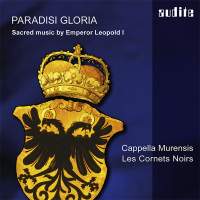Texte paru dans: / Appeared in: |
|
|
Outil de traduction (Très approximatif) |
|
|
Reviewer:
David Vickers
Emperor Leopold I (1640-1705) was one of the most musically minded of the Habsburg Holy Roman Emperors. His cultivation of Italianate musical culture in Vienna included the employment of Cesti, Draghi, Bononcini and Conti; he also advanced the careers of native composers Schmelzer, Kerll and Fux. The emperor was also an able composer, and a recent gramophone.co.uk recording of Il lutto dell’universo (Fra Bernardo) represented his interest in the sacred dramatic sepolcri, whereas the combined forces of Les Cornets Noirs, Cappella Murensis and Johannes Strobl explore some of Leopold’s liturgical music. A four-part Stabat mater in B minor (1678) is an episodic setting that offers plangent contrapuntal gestures, performed with consummate skill by the fine company of soloists (forming a coro favorito), with the doleful texture swollen by two extra ripieno singers on each part from time to time. The assorted instrumentalists and the choir demonstrate their collective sense of musical shapeliness in the Missa pro defunctis (1673), composed by Leopold for the funerary exequies of his first wife (and niece) Margarita Teresa of Spain (the occasion also featured Requiems by Bertali and Schmelzer). The Nocturni pro defunctis (1676) is one of three substantial lections Leopold wrote for the burial service of his second wife, the Tyrolean princess Claudia Felicitas – and it was also performed at his own funeral in 1705. Broadly speaking, these larger works emulate the Venetian style of polychoral textures, solo monodic passages and concertato instrumental sections (played excellently by cornettos, trombones, violas da gamba, violone, archlute and organ). The widower’s personal grief in the final movement of the lection is shared compassionately by Lisandro Abadie accompanied by a consort of viols, who are responded to by chromatically rising choral lamentations until they resolve eloquently. |
|




